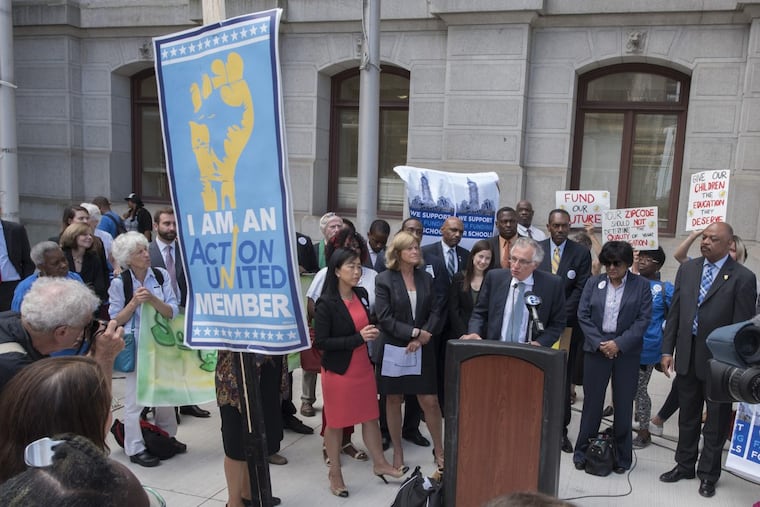Pennsylvania school-funding lawsuit seems poised to proceed
"The only thing in question is how long it will take us to get to trial, not whether it will get to trial," Michael Churchill, a Public Interest Law Center lawyer representing the plaintiffs, said of a landmark school-funding case.

Top Pennsylvania Republicans tried again Wednesday to block a challenge to the way schools are funded in the state, but a landmark lawsuit over the issue seemed poised to proceed after a Commonwealth Court hearing.
Lawyers for the plaintiffs, including the William Penn School District and parents in Philadelphia and Delaware County, said after the hearing they were confident the case would move forward.
"The only thing in question is how long it will take us to get to trial, not whether it will get to trial," said Michael Churchill, a Public Interest Law Center lawyer, representing the plaintiffs.
The suit, first brought in 2014, contends the way Pennsylvania funds its public schools is unfair, inadequate, and unconstitutional. It alleges state officials have "adopted an irrational school funding system that does not deliver the essential resources students need and discriminates against children based on where they live and the wealth of their communities."
The case has broad implications for the commonwealth's 500 school districts and the more than one million children they educate.
The state Supreme Court last fall overturned an earlier Commonwealth Court dismissal of the suit — sending it back to the lower court. On Wednesday, the five-judge panel, sitting in Philadelphia, considered new objections by Pennsylvania Senate President Pro Tempore Joe Scarnati (R., Jefferson) and House Speaker Mike Turzai (R., Allegheny).
Lawyers for the GOP legislative leaders argued that the lawsuit was misguided. Patrick M. Northen, a lawyer for Turzai, said students have "no fundamental right to equality in education" under the state constitution. The lawyers also said a 2016 state formula adopted under Gov. Wolf for distributing new education dollars had invalidated the challenge by cash-strapped school districts and parents.
The Commonwealth Court judges didn't immediately rule on the lawmakers' objections but indicated they were grappling with how to determine whether the legislature was fulfilling its constitutional mandate to provide a "thorough and efficient" education.
Brad Elias, a lawyer for the plaintiffs, said school districts without strong tax bases "have no control" in the current funding system, because they rely on the state to help pay for public education.
While the new funding formula directs added money to districts for students with greater needs, it only applied to new spending, Elias said. He said just 2 percent of overall state education funding goes through the formula — meaning disparities still exist between rich and poor districts.
"You're basically saying, 'They're rearranging the deck chairs, and what we need is a bigger boat,' " said Judge Michael Wojcik.
Besides William Penn, plaintiffs include the Panther Valley School District in Carbon County, the School District of Lancaster, the Greater Johnstown School District in Cambria County, the Wilkes-Barre Area School District in Luzerne County, and the Shenandoah Valley School District in Schuylkill County. The NAACP and the Pennsylvania Association of Rural and Small Schools filed on behalf of their members.
Michael Vuckovich, interim superintendent of the Greater Johnstown School District, said that since he's taken over the financially struggling district, he's had to close a school building, eliminate programs, and lay off staff. Almost half his students live in poverty.
"We are unable to provide the much-needed supports they deserve," Vuckovich said at a news conference after the hearing. "The commonwealth is, quite simply, failing our children."
Jamella and Bryant Miller, Lansdowne residents and parents of two students in the William Penn School District, said the evidence of the lackluster education their son and daughter receive is all around them — the lack of textbooks and technology, the crumbling buildings. On rainy days, they said, their daughter's coat comes home soaked because the ceiling in the classroom coat closet leaks.
"We pay taxes just like everybody else," said Jamella Miller. "And we pay more because we're in a failing district, and that's unfair."